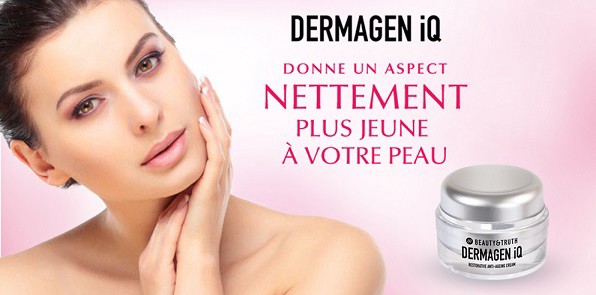Dermagen IQ : Can You Really Trust on This Cream
Dermagen IQ needs AHA's and BHA's in your cleansing merchandise. AHA's (alpha hydroxyl acid) and BHA's (beta hydroxyl acid) are naturally occurring compounds found in milk and fruit. There is a few concern that glycolic acid (created from fruit) will cause irritation and therefore the skin to dry out, this is often as a result of the molecules are very tiny thus they tend to penetrate terribly deeply, because of this a heap of cosmetic makers are currently using Lactic acid created of milk, because it tends to be more moisturising..
Though Webster defines "natural" as "not artificial, artificial, [or] acquired by external means," it is the rare cosmetic ingredient that fits that description. Even water utilized in cosmetics is mostly distilled, deionized, or otherwise purified. Dermagen IQ along the continuum of "natural" products, choices have been made to emulsify, stabilize and preserve--to make the product smooth and creamy, keep them recent, and offer them an appropriate shelf life. Even if consumers want merchandise that require to be refrigerated, distributors and retailers can not order them as a result of of the added prices of shipping, storing and greater liability.
A growing number of consumers who seek that kind of freshness are firing up their blenders and following recipes for homemade treatments.1[1] Even these, however, call for essential oils, alcohol, glycerin, lanolin, etc., which are an extended approach from their natural origins.
As reported in Strong Voices, the newsletter of the Breast Cancer Fund, "Approximately one-third of cosmetics and bodycare firms position their products as natural in one method or another . . . But, as you would possibly expect, some firms are a lot of natural than others".
Dermagen IQ Reviews
Most folks who seek out "natural" merchandise are wanting for ingredients whose sources they acknowledge, and that's why many companies now Dermagen IQ list the supply along with the scientific name of the ingredient, as in sodium laurel sulfate (from coconut), or lanolin (from wool). Turpentine comes from pine trees.
My grandmother, born in 1901, swore that turpentine helped her arthritic hands, and he or she may have rubbed them with lard (from bacon) afterwards to keep them as soft as I remember. Perhaps lard and turpentine are "natural," but are they sensible for the skin, and along with that, what's the definition of "good?" Again, there aren't any easy answers.
Visit Here : http://supplementsbook.org/dermagen-iq/
Though Webster defines "natural" as "not artificial, artificial, [or] acquired by external means," it is the rare cosmetic ingredient that fits that description. Even water utilized in cosmetics is mostly distilled, deionized, or otherwise purified. Dermagen IQ along the continuum of "natural" products, choices have been made to emulsify, stabilize and preserve--to make the product smooth and creamy, keep them recent, and offer them an appropriate shelf life. Even if consumers want merchandise that require to be refrigerated, distributors and retailers can not order them as a result of of the added prices of shipping, storing and greater liability.
A growing number of consumers who seek that kind of freshness are firing up their blenders and following recipes for homemade treatments.1[1] Even these, however, call for essential oils, alcohol, glycerin, lanolin, etc., which are an extended approach from their natural origins.
As reported in Strong Voices, the newsletter of the Breast Cancer Fund, "Approximately one-third of cosmetics and bodycare firms position their products as natural in one method or another . . . But, as you would possibly expect, some firms are a lot of natural than others".
Dermagen IQ Reviews
Most folks who seek out "natural" merchandise are wanting for ingredients whose sources they acknowledge, and that's why many companies now Dermagen IQ list the supply along with the scientific name of the ingredient, as in sodium laurel sulfate (from coconut), or lanolin (from wool). Turpentine comes from pine trees.
My grandmother, born in 1901, swore that turpentine helped her arthritic hands, and he or she may have rubbed them with lard (from bacon) afterwards to keep them as soft as I remember. Perhaps lard and turpentine are "natural," but are they sensible for the skin, and along with that, what's the definition of "good?" Again, there aren't any easy answers.
Visit Here : http://supplementsbook.org/dermagen-iq/





Comments
Post a Comment